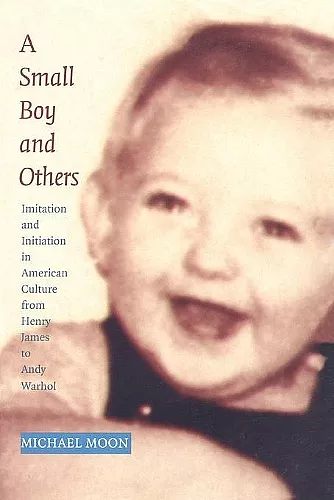A Small Boy and Others
Imitation and Initiation in American Culture from Henry James to Andy Warhol
Format:Paperback
Publisher:Duke University Press
Published:29th Apr '98
Currently unavailable, and unfortunately no date known when it will be back

In A Small Boy and Others, Michael Moon makes a vital contributon to our understanding of the dynamics of sexuality and identity in modern American culture. He explores a wide array of literary, artistic, and theatrical performances ranging from the memoirs of Henry James and the dances of Vaslav Nijinsky to the Pop paintings of Andy Warhol and such films as Midnight Cowboy, Blue Velvet, and Jack Smith’s Flaming Creatures.
Moon illuminates the careers of James, Warhol, and others by examining the imaginative investments of their protogay childhoods in their work in ways that enable new, more complex cultural readings. He deftly engages notions of initiation and desire not within the traditional framework of “sexual orientation” but through the disorienting effects of imitation. Whether invoking the artist Joseph Cornell’s early fascination with the Great Houdini or turning his attention to James’s self-described “initiation into style” at the age of twelve—when he first encountered the homoerotic imagery in paintings by David, Géricault, and Girodet—Moon reveals how the works of these artists emerge from an engagement that is obsessive to the point of “queerness.”
Rich in historical detail and insistent in its melding of the recent with the remote, the literary with the visual, the popular with the elite, A Small Boy and Others presents a hitherto unimagined tradition of brave and outrageous queer invention. This long-awaited contribution from Moon will be welcomed by all those engaged in literary, cultural, and queer studies.
“[In this] mesmerizing book . . . Moon can unleash power of his own in some of the most subtle and loamy literary and cultural criticism available anywhere. . . . The criticism he offers is unfailingly generous, both to the works and to us: he hopes his collection of queernesses may ‘contribute to the production of an expanded critical field.’ Let’s hope so.” - American Literature
“Moon is an elegant reader, at his best when revealing layers of disruption and elusive motivation embedded within seemingly reticent texts.” - BookForum
“[A] highly original approach. . . . Individual chapters are brilliant. . . . [T]his is highly recommended for collections supporting graduate work in queer theory and cultural studies.” - Library Journal
“[Moon’s] aim is ambitious: to highlight points of continuity between formative influences of American queer culture during two critical decades—one following the conviction of Oscar Wilde (1895) and the other leading up to the period of the Stonewall riots (1969). Shuttling between these two periods, Moon examines how a variety of artists with queer sensibilities precociously identified themselves as outsiders highly sensitive to cultural disconnection and personal loss. . . . Moon juxtaposes figures not usually yoked in critical inquiry: Henry James and David Lynch, Vaslav Nijinksy and Jack Smith, Andy Warhol and John Schlesinger, Joseph Cornell and Gerard deNerval. In each instance, his intent is explicitly revisionist: he proposes a radical reassessment of the significance of the artists’ works. Scholars and students aware of these artists should find Moon’s argument provocative.” - Choice
“Refreshing and original. . . .” - Eric Savoy, The Henry James Review
“Moon’s analyses are shrewd and compassionate about their subjects, and give powerful evidence to the value of queer theory for criticism in general—the value of an open generosity of attention that is becoming increasingly rare within straightened and specialised academia.” - Ian F. A. Bell, American Studies
“Michael Moon’s beautifully written book offers splendid and nuanced readings of American literature and culture that move the project of queer literary practice into a new order of complexity and subtlety. His radical contributions show that queer imitation involves a disorientation of mimesis, affirming both the sympathetic and divisive dimensions of identification. Moving, incisive, and bold, Moon’s writing approaches moments of rapture and loss and fails to tame them.”—Judith Butler
“[A] highly original approach. . . . Individual chapters are brilliant. . . . [T]his is highly recommended for collections supporting graduate work in queer theory and cultural studies.” * Library Journal *
“[In this] mesmerizing book . . . Moon can unleash power of his own in some of the most subtle and loamy literary and cultural criticism available anywhere. . . . The criticism he offers is unfailingly generous, both to the works and to us: he hopes his collection of queernesses may ‘contribute to the production of an expanded critical field.’ Let’s hope so.” * American Literature *
“[Moon’s] aim is ambitious: to highlight points of continuity between formative influences of American queer culture during two critical decades—one following the conviction of Oscar Wilde (1895) and the other leading up to the period of the Stonewall riots (1969). Shuttling between these two periods, Moon examines how a variety of artists with queer sensibilities precociously identified themselves as outsiders highly sensitive to cultural disconnection and personal loss. . . . Moon juxtaposes figures not usually yoked in critical inquiry: Henry James and David Lynch, Vaslav Nijinksy and Jack Smith, Andy Warhol and John Schlesinger, Joseph Cornell and Gerard deNerval. In each instance, his intent is explicitly revisionist: he proposes a radical reassessment of the significance of the artists’ works. Scholars and students aware of these artists should find Moon’s argument provocative.” * Choice *
“Moon is an elegant reader, at his best when revealing layers of disruption and elusive motivation embedded within seemingly reticent texts.” * BookForum *
“Moon’s analyses are shrewd and compassionate about their subjects, and give powerful evidence to the value of queer theory for criticism in general—the value of an open generosity of attention that is becoming increasingly rare within straightened and specialised academia.” -- Ian F. A. Bell * American Studies *
“Refreshing and original. . . .” -- Eric Savoy * The Henry James Review *
ISBN: 9780822321736
Dimensions: unknown
Weight: 413g
208 pages